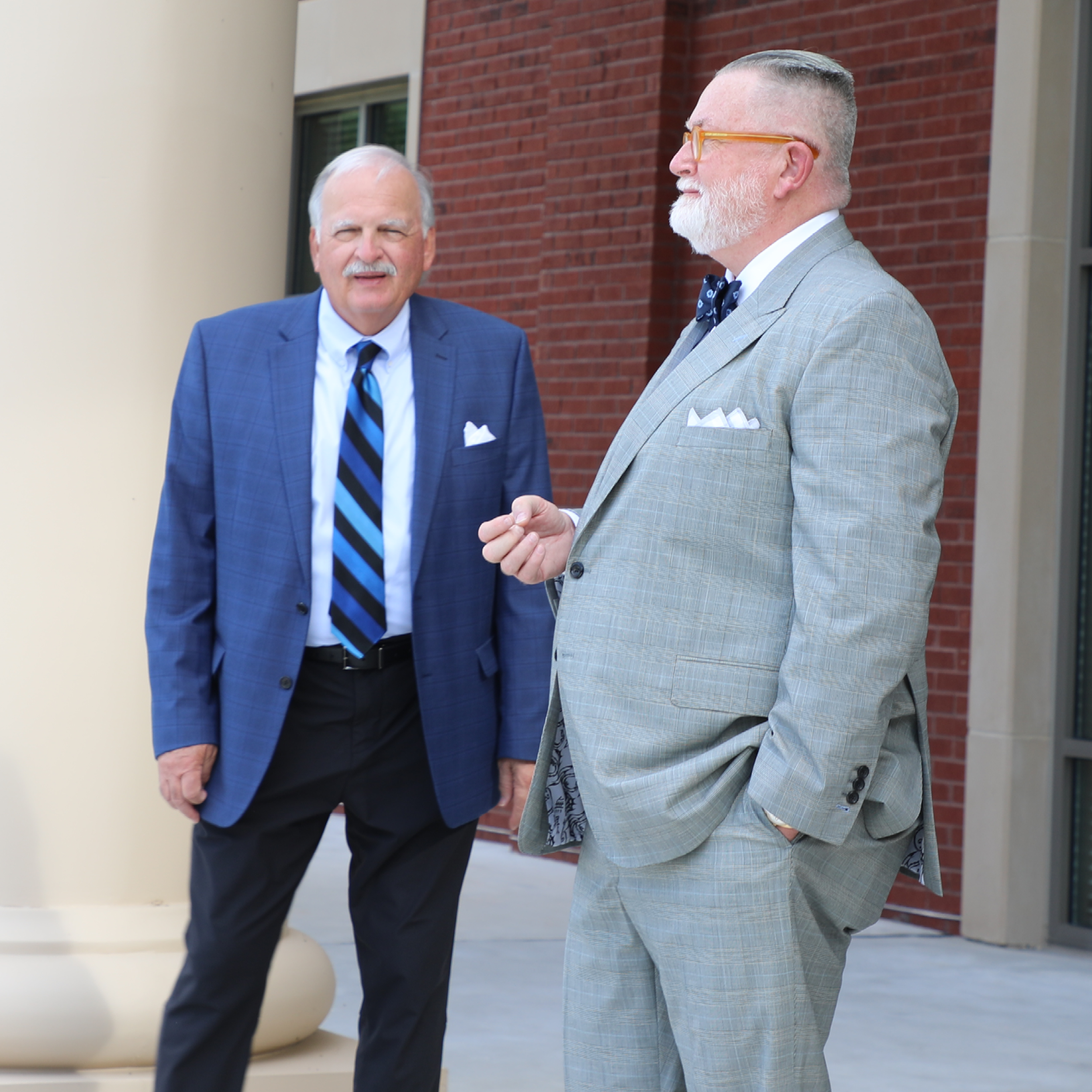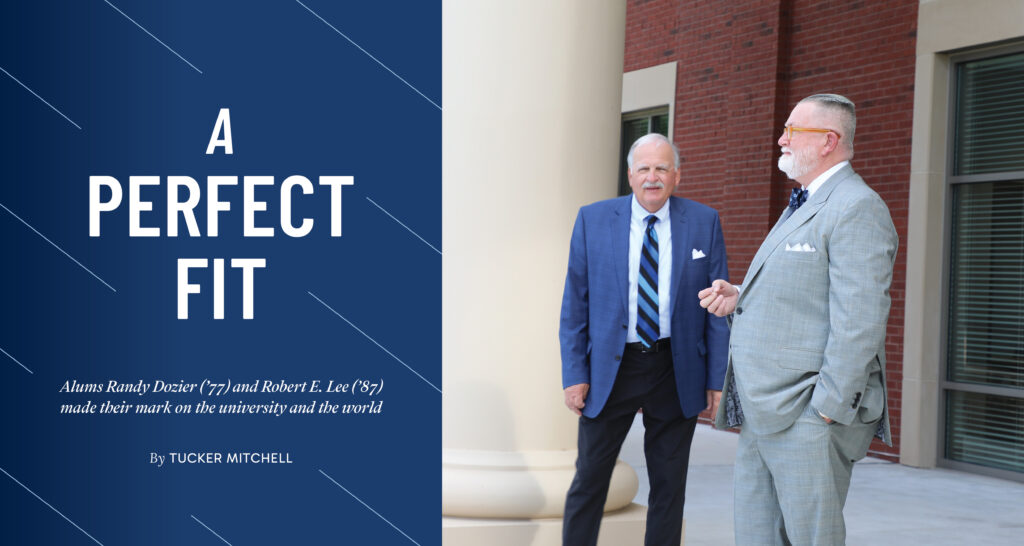December 10, 2024

A Perfect Fit
A Perfect Fit
By Tucker Mitchell | Fall/Winter 2024 | FMU Focus Magazine Fall/Winter 2024

Alums Randy Dozier (’77) and Robert E. Lee (’87) made their mark on the university and the world
FMU’s long tradition of naming buildings and facilities after its sons and daughters continued this fall when the wings of the university’s new business and education building were named after alums Robert E. Lee (’87) and Dr. H. Randall Dozier (’77).
It is a fitting honor.
The new building might have been built if they hadn’t been around, but the university would be an entirely different place if not for their faithful, behind-the-scenes service on FMU’s Board of Trustees.
Dozier and Lee have both been on the board for more than two decades. Both have chaired it several times, and, perhaps most importantly, both were part of the movement that brought Dr. Fred Carter to FMU in 1999. Carter’s arrival, as every Patriot knows, ushered in an era of unprecedented growth and unlocked the promise of the future still to come.
Carter, now in his 25th year at FMU, says that while casting the votes for change was important, that wasn’t their most critical contribution.
“Robert, Randy – and I’d certainly include other long-term trustees like Ken Jackson and George McIntyre – they were the major advocates in pulling people together for change at an important time in the university’s history,” says Carter. “That can’t be understated. But what they also did was change the perspective, from a board of trustees that heavily influenced the administration and faculty to one that was focused on policy. They stepped away from trying to manage the day-to-day affairs.
“Which,” Carter says, “is exactly the opposite of what you see from most boards and board members, and which is one of the great secrets to any success we may have had here.”
Says Lee, who was elected board chairman just as Carter became FMU’s new president, “From the beginning (with Carter) we talked about this thing called shared governance. … We started moving towards that model.
“It’s not complicated, really,” says Lee. “Everyone has a job and stays in their lane. We got the board out of management, out of academics. We set policy. Dr. Carter and the administration can handle that, and faculty can handle the academic side. You trust each other enough to do your job, and that’s what we did and as you can see, it really works well.”
Carter says naming the wings of the new building is the perfect tribute for “two loyal alums who have worked hand in hand on so many issues through the years. It’s a great way for us to honor and remember them, and they should be remembered. They made a tremendous difference in this university.”
The wing housing FMU’s School of Education is named for Dozier, a long-time teacher and educational administrator. He served in the Greenville School District for many years before moving to the Georgetown County School District in 2003 as its superintendent.
Dozier calls the honor “very humbling, but very meaningful to me, to my family.
“You know I was here, I can remember when there weren’t that many buildings at FMU,” says Dozier. “To have my name on one, especially on one that looks like this, it’s just hard to grasp.”
The School of Business wing is named for Lee, a lawyer, but an enthusiastic business grad who still recalls with great fondness professors like Dr. Morgan Coker, the first dean of business, and Dr. Don Kelley.
“I do remember at my graduation, looking up on the stage and seeing all those people and thinking to myself, ‘gee wouldn’t it be great if some day I could do something to get up there,’” says Lee, “but to be honest, I never imagined I’d receive any real honors, and not in my wildest dreams did I imagine that one day I’d have my name on a building. I mean, I was surprised the first time I saw my name on one of the new building plaques.
“That’s not why you serve, but I am honored. It really means a lot.”
No moon, but plenty of stars
There was no clear path to a career in education for Randy Dozier. In fact, the first idea was that dream of every little boy of a certain era: he’d be an astronaut.
It might have happened. Dozier was the product of a large, somewhat connected family from Marion County. Among his parents’ 25 – 25! – brothers and sisters were numerous military men and women. So he had the background. He was a pretty sharp student in high school, an athlete, too. He looked the part.
An application to the Air Force Academy was assembled, Congressman Ed Young and Senator Strom Thurmond providing the necessary recommendations. He was on his way. …
And then, at a routine doctor’s appointment, Dozier discovered he had Type 1 Diabetes.
“I mean, I was really surprised,” says Dozier. “I’d played lots of sports, been active … had already passed the flight physicals with no issues. Everybody wanted to be in the Air Force then – the moon shots and all. I don’t know. My grades might have been on the border. I probably would have made it. If not, maybe another service academy. That’s the way I was headed. But, I didn’t get what I was expecting. Sometimes that’s the way life happens.”
Some re-thinking led him to a practical option: Francis Marion College, the local school that had just moved to a four-year model a few years before.
It turned out to be the perfect place for Dozier, a practical guy. He could work (in the radiology department at McLeod), go to class, get a great education, earn his degree, and finish with no debt (which he still thinks is a very good thing).
“It was a quality education,” says Dozier. “I have four college degrees, including an earned PhD. I was in a total of something like 300 (credit) hours of class and went to school with a lot of people from all over the country, people from a lot of places, Wake Forest, Duke, others. And I was just as prepared, maybe more so. I never had a problem with the work. The professors I had at FMU actually knew you, people like Joe Heyward, Dr. (Lorraine) de Montluzin, Ron Faulkenberry, Joe Stukes. They knew who you were and what you did. And when you needed a little guidance, they were there.”
Dozier majored in political science and history and pondered a career in the law, but “kind of ran out of money.”
So, he stayed through one extra year at FMU and earned his teacher’s certification. He figured teaching and coaching would be a good life, a way to give back, and that’s what he did for seven years. But he was still the talented young man who might have been an astronaut. It wasn’t long before he was approached about school administration.
He became a principal in Greenville County, then moved to central administration. His portfolio wound up touching on a variety of areas – transportation, construction, facilities management – thankless jobs in many ways, but a natural course for a person who exuded competence and confidence.
And, superb training, as it turned out, for a future superintendent.
“I was never afraid of any assignment, and I wound up doing a lot of stuff that others did not want to,” says Dozier. “It made me better.”
He landed a deputy superintendent’s job in Georgetown, back near his family’s old stomping grounds, in the early 2000s. A few years later, the superintendent left in mid-year and Dozier was named interim. After a search, he landed the post on a permanent basis.
It’s where he stayed the rest of his career. He retired in 2020.
Dozier approached his career with a large dose of humility. When he left FMU in 1978, he wasn’t trying to save the world.
“I just wanted to, you know, find a way to pay a few bills, make a way for a family,” Dozier says.
Along the way he discovered he was good at what he did and was, in fact, helping people.
An often-stern man, emotions bubble surprisingly close to the surface of Dozier’s exterior shell. He tears up easily talking about kids who’ve told him about the difference he made in their lives. He cannot hide the joy in relating the story of a former Georgetown County student who graduated from FMU a few years later. Dozier was chair of FMU’s board of trustees at the time – he’s served in that role several times – and as a result, his signature was on the student’s FMU diploma.
Just as it had been on the student’s high school diploma.
“This kid was a terrific student,” says Dozier. “We had kind of funneled him towards FMU. He majored in physics. He’s working at a nuclear plant now. Anyway, at graduation he comes up to me and says, ‘you signed my high school diploma and now my FMU diploma, too! That’s really cool!’
“I’ll have to say that that was nice,” says Dozier. “It kind of makes it all worthwhile. I mean, signing two diplomas for the same kid? And there are actually several of them around now. If anyone can beat that, I’d like to hear about it.”
It might even be better than going to the moon.
Not that Robert E.
He’s an attorney from Marion, S.C., who likes to fish and wear bow ties, and, when it gets real hot, which it always does, seersucker suits, too. His name is Robert E. Lee, and upon hearing that, most people say, or at least think, well, that fits.
And it does, but not in the way people imagine. His family name is Lee, but the Robert E. part? That is something entirely different.
He is named after Robert Eugene Picirilli, a professor at Welch College, a Free Will Baptist college in Gallatin, Tenn., who, once upon a time, inspired and mentored a ministerial student named Sherwood Lee. Sherwood married Bada and when it came time to name their first boy, dad could think of no one better to name him after than Robert E. Picirilli. Mom liked Sebastian, for a popular TV star at the time. In this one instance, she was overruled.
And it does fit. Robert E. Lee may not be a stereotypical son of the South. He is certainly the son of a missionary. He was born in Nashville, not far from Gallatin, but spent his formative years in Africa. Most of his education came at the Ivory Coast Academy, a school for missionary kids from all around northern and eastern Africa. His father, a licensed nurse practitioner, ran a mission hospital. His mother taught reading in the local school. “Bobby” rode a school bus a long way to school and back, an education in itself and one that has stayed with him forever. He does not look at the world just like everyone else.
About the time their elder child was ready to start college, the Lees ended their 14-year missionary journey and moved back home to the Pee Dee Region in South Carolina. “Bobby” went to Nyack College in New York, an institution with roots as a missionary training school, and one, consequently, that was often attended by missionary kids. But he eventually decided to move home and go to the local public college, a place called Francis Marion.
His mother was a grad. It was close to home.
“It just made sense,” Lee says.
Lee flourished at FMU, graduating with one of the university’s first business degrees. He went to law school at the University of South Carolina. He returned to the Pee Dee area, to Florence, to begin crusading for a variety of clients in a practice that has now stretched to 30 years.
That was his first calling. His second came in the late 1990s, when he learned his collegiate alma mater was floundering. He began a new career of sorts, crusading this time as a member of the FMU Board of Trustees for the changes needed to get his school fixed. After affecting what was really the one absolutely necessary change – bringing Dr. Fred Carter to FMU as president – he set about doing all he could to support the man he calls “the greatest college president ever.”
“I can still remember the first time (a group of the trustees) went to see (Fred Carter),” says Lee. “There was this little bald-headed guy in his office at the (South Carolina) Budget and Control Board, smoking a pipe. It didn’t take long being around him to see that he was the person we needed. It was apparent the first time he walked into a meeting. You could feel the energy. He already understood all the problems, and was already working on ways to solve them. It’s not an overstatement to say he saved us. I’m just glad to be around him. He made all the hours I’ve put in well worth it.”
Lee says he’s comfortable with his board of trustee work being his legacy. As he learned years ago in Africa, the world is a big place but everyone can find a worthwhile place in it.
“Friends will sometimes ask me, ‘when are you getting off the board?’ They figure it’s a big burden and that I’m always ready to go,” he says. “I tell them ‘no, I’m not going anytime soon if I can help it. What I’m trying to do is to figure out what’s next?’
“I’ve become addicted to ‘what’s next?’ I guess you could say. There’s never an end, a stopping point, at FMU. That’s not the way it works here. As long as there’s one first generation student out there who can be helped, then we’ll be looking for new ways to help them. I want to be a part of that.”














